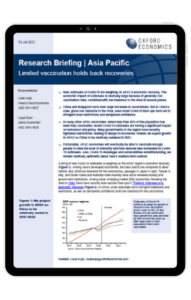APAC | Limited vaccination holds back recoveries

A string of new Covid-19 outbreaks is weighing on the APAC region’s economic recovery. Among Asia’s developed economies, the case load is low compared to other nations. But, amid low tolerance for the coronavirus, upsurges in Japan in April, Taiwan in May, and South Korea and Australia more recently have led to renewed anxiety and government restrictions. Among Asian emerging market (EM) economies, following the crisis in India, there have recently been serious flare-ups in Thailand, Indonesia and,
especially, Malaysia.
What you will learn:
- ONew outbreaks of Covid-19 are weighing on APAC’s economic recovery. The
economic impact of outbreaks is relatively large because of generally low vaccination rates, combined with low tolerance to the virus in several places. - China and Singapore have seen large increases in vaccinations. But in China’s case, given low tolerance to the virus, even small Covid-19 flare ups have led to stringent local restrictions and dampened confidence.
- In many other APAC economies, where less than 20% of the population has been fully vaccinated, recent Covid-19 outbreaks are having a significant impact on behaviour and policy. Many governments in the region have recently tightened restrictions, leading to delays in recoveries. Indeed, we expect growth
in APAC ex-China to be relatively subdued in 2021. - Fortunately, APAC economies will eventually be able to vaccinate enough people to raise the level of immunity and thus become less vulnerable to Covid- 19 outbreaks. Also, Covid-19 challenges and vulnerabilities notwithstanding, we remain relatively optimistic about Asia’s medium-term outlook.
Tags:
Related Services

Post
UK : The everyday economy matters to local economic performance
The everyday economy generates half of all UK employment and 33% of GVA but is often dismissed because it generates less growth than high value services and has low productivity. But indirectly it has the capacity to improve the competitiveness and performance of local economies and has been identified by Labour Party leaders as a sector to focus on, if they win the election.
Find Out More
Post
Amid disruption, what can US office learn from retail?
We examined the disruption of generative AI at the US county level. We identified several metros – Atlanta, Denver, New York, San Francisco, and Washington DC – that had at least one county with the highest percent of displaced workers from AI.
Find Out More